狄金森诗歌EmilyDickinson
emily_dickinson诗歌赏析

①I’m Nobody!我是无名之辈-Emily DickinsonI’m nobody! Who are you?我是无名之辈!你是谁?Are you nobody, too?你也是无名之辈吗?Then there’s a pair of us----don’t tell!那么我们就是一对儿了!千万不要透露出去They’d banish us, you know!不然我们都会被他们驱逐,你知道。
How dreary to be somebody!做一个某某,是多么沉闷无聊How public, like a frog众人像是青蛙To tell your name the livelong day整日地把你谈论啊To an admiring bog!对着他们倾慕的泥沼我是无名之辈艾米莉·狄金森我是无名之辈,你是谁?你,也是,无名之辈?这就凑成一双,别声张!你知道,他们会大肆张扬!做个,显要人物,好不无聊!像个青蛙,向仰慕的泥沼——在整个六月,把个人的姓名聒噪——何等招摇!This poem is Dickinson’s most famous and most defense of the kind of spiritual privacy she favored, implying that to be a Nobody is a luxury incomprehensible to a dreary somebody—for they are too busy keeping their names in circulation. But to be somebody is not as fancy as it seems to be.Emily DickinsonAs you probably noticed when you read this poem, none of the themes that I discussed in the Overview of Dickinson applies to this poem. My list was not meant to cover every topic Dickinson wrote on, nor does every poem she wrote fit neatly into a category.Dickinson adopts the persona of a child who is open, naive, and innocent. However, are the questions asked and the final statement made by this poem naive? If they are not, then the poem is ironic because of the discrepancy between the persona's understanding and view and those of Dickinson and the reader. Under the guise of the child's accepting society's values, is Dickinson really rejecting those values?Is Dickinson suggesting that the true somebody is really the "nobody"? The child-speaker welcomes the person who honestly identifies herself and who has a true identity. These qualities make that person "nobody" in society's eyes. To be "somebody" is to have status in society; society, the majority, excludes or rejects those who lack status or are "nobody"--that is, "they'd banish us" for being nobody.In stanza 2, the child-speaker rejects the role of "somebody" ("How dreary"). The frog comparison depicts "somebody" as self-important and constantly self-promoting. She also shows the false values of a society (the "admiring bog") which approves the frog-somebody. Does the word "bog" (it means wet, spongy ground) have positive or negative connotations? What qualities are associated with the sounds a frog makes (croaking)?Is there satire in this poem?Some readers, who are modest and self-effacing or who lack confidence, feel validated by this poem. Why?②To Make a Prairie…To make a prairieIt takes a clover and one bee,One clover and a bee,And revery.Revery alone will do,If bees are few.去造一个草原张祈试译去造一个草原需要一株三叶草和一只蜜蜂,一株三叶草和一只蜜蜂,还有梦。
艾米莉·狄金森

艾米莉·狄金森假如我不曾见过太阳(Had I not seen the Sun)是美国著名女诗人艾米莉·狄金森作的一首小诗,相传本诗作于1872年。
该诗秉承了狄金森一贯简洁的诗风,四行两句,意蕴无穷。
艾米莉·狄金森(也译作狄更生)(Emily Dickinson),美国诗人。
1830年12月10日生于马萨诸塞州阿默斯特镇,出生于律师家庭。
青少年时代生活单调而平静受正规宗教教育。
1886年5月15日去世。
她20岁开始写诗,早期的诗大都已散失。
1858年后闭门不出,70年代后几乎不出房门,文学史上称她为“阿默斯特的女尼”。
她在孤独中埋头写诗三十年,留下诗稿1,775首。
在她生前只有7首诗被朋友从她的信件中抄录出并发表,其余的都是她死后才出版,并被世人所知名气极大。
她的诗在形式上富于独创性,大多使用17世纪英国宗教圣歌作者艾萨克·沃茨的传统格律形式,但又作了许多变化,例如在诗句中使用许多短破折号,既可代替标点,又使正常的抑扬格音步节奏产生突兀的起伏跳动。
她的诗大多押半韵。
英语原文Had I not seen the Sun------- by Emily DickinsonHad I not seen the SunI could have borne the shadeBut Light a newer WildernessMy Wilderness has made —译文一(江枫/译)我本可以忍受黑暗如果我不曾见过太阳然而阳光已使我的荒凉成为更新的荒凉译文二假如我没有见过太阳我也许会忍受黑暗;可如今,太阳把我的寂寞照耀得更加荒凉创作背景相传这首诗作于1872年,这时候的狄金森已经42岁,过了自己的创作黄金期。
但恰恰因为喷涌的诗情慢慢平缓,诗人的笔触也更加冷静并充满思考。
42年人间岁月,喜悲寒暑,就是这一番。
诗歌赏析该诗秉承了狄金森一贯简洁的诗风,四行两句,意蕴无穷。
i'm nobody 诗歌汉译
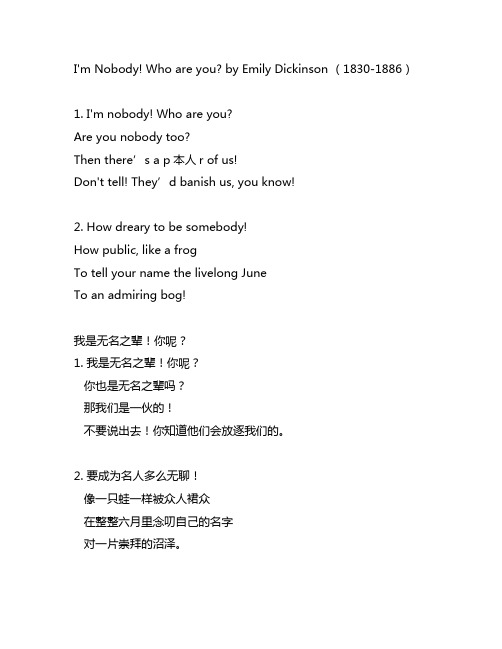
I'm Nobody! Who are you? by Emily Dickinson (1830-1886)1. I'm nobody! Who are you?Are you nobody too?Then there’s a p本人r of us!Don't tell! They’d banish us, you know!2. How dreary to be somebody!How public, like a frogTo tell your name the livelong JuneTo an admiring bog!我是无名之辈!你呢?1. 我是无名之辈!你呢?你也是无名之辈吗?那我们是一伙的!不要说出去!你知道他们会放逐我们的。
2. 要成为名人多么无聊!像一只蛙一样被众人裙众在整整六月里念叨自己的名字对一片崇拜的沼泽。
以上是美国诗人艾米莉·狄金森所作诗歌《我是无名之辈》的原文,以下为该诗的汉译:我是无名之辈!你呢?——艾米莉·狄金森1. 我是无名之辈!你呢?你也是无名之辈吗?那我们是一伙的!不要告诉他们!他们会把我们放逐。
2. 成为名人多么无聊!像蛙一样公开地在整整六月里对着仰慕的泥塘说出自己的名字。
这首诗简短而富有内涵,表达了诗人对于平凡的认同和对名利的厌倦之情。
通过对诗歌的汉译,我们也可以更加深入地理解诗意所在。
在第一节中,诗人通过对“无名之辈”的自我认同,暗示了对于平凡生活的接纳和渴望找到知己的心情。
她也警示了“不要告诉他们”,即不要向社会展现自己的真实面目,以免被排挤和孤立。
而第二节则明确表达了诗人对于成为名人和备受瞩目的反感之情,她将之形象地比喻为“公开地在整整六月里告诉泥塘自己的名字”,充满了对于世俗名利的鄙视和对于宁静平淡生活的向往。
在这首诗中,艾米莉·狄金森用简练而雄辩的语言,表达了自己对于平凡的理解和对于名利的厌倦之情,以及对于自由和隐秘生活的向往。
艾米莉·狄金森《我为美而死》及诗歌中死亡意象
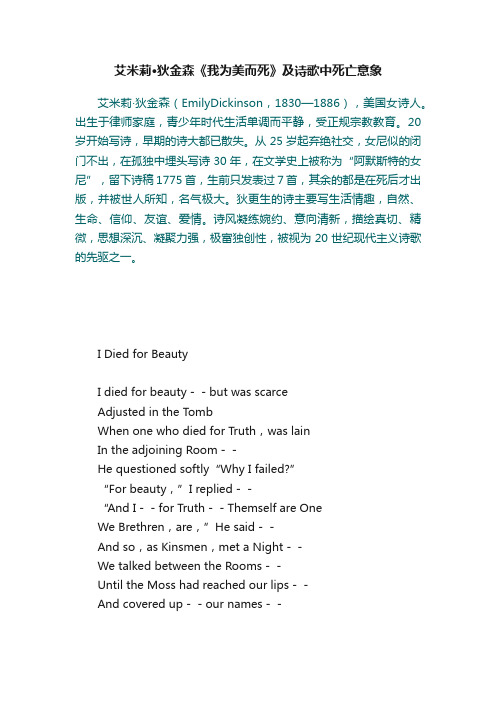
艾米莉·狄金森《我为美而死》及诗歌中死亡意象艾米莉·狄金森(EmilyDickinson,1830—1886),美国女诗人。
出生于律师家庭,青少年时代生活单调而平静,受正规宗教教育。
20岁开始写诗,早期的诗大都已散失。
从25岁起弃绝社交,女尼似的闭门不出,在孤独中埋头写诗30年,在文学史上被称为“阿默斯特的女尼”,留下诗稿1775首,生前只发表过7首,其余的都是在死后才出版,并被世人所知,名气极大。
狄更生的诗主要写生活情趣,自然、生命、信仰、友谊、爱情。
诗风凝练婉约、意向清新,描绘真切、精微,思想深沉、凝聚力强,极富独创性,被视为20世纪现代主义诗歌的先驱之一。
I Died for BeautyI died for beauty--but was scarceAdjusted in the TombWhen one who died for Truth,was lainIn the adjoining Room--He questioned softly“Why I failed?”“For beauty,”I replied--“And I--for Truth--Themself are OneWe Brethren,are,”He said--And so,as Kinsmen,met a Night--We talked between the Rooms--Until the Moss had reached our lips--And covered up--our names--我为美而死去我为美而死——对坟墓几乎,还不适应一个殉真理的烈士就成了我的近邻——他轻声问我“为什么倒下?”我回答他:“为了美”——他说:“我为真理,真与美——是一体,我们是兄弟”——就这样,像亲人,黑夜相逢——我们,隔着房间谈心——直到苍苔长上我们的嘴唇——覆盖掉,我们的姓名——《我为美而死》是女诗人对美与真理关系进行探讨的一首诗。
艾米莉·狄金森《我为美而死》
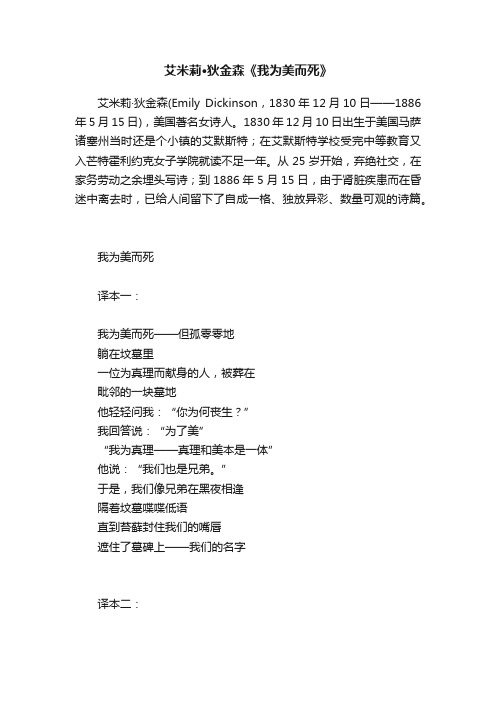
艾米莉·狄金森《我为美而死》艾米莉·狄金森(Emily Dickinson,1830年12月10日——1886年5月15日),美国著名女诗人。
1830年12月10日出生于美国马萨诸塞州当时还是个小镇的艾默斯特;在艾默斯特学校受完中等教育又入芒特霍利约克女子学院就读不足一年。
从25岁开始,弃绝社交,在家务劳动之余埋头写诗;到1886年5月15日,由于肾脏疾患而在昏迷中离去时,已给人间留下了自成一格、独放异彩、数量可观的诗篇。
我为美而死译本一:我为美而死——但孤零零地躺在坟墓里一位为真理而献身的人,被葬在毗邻的一块墓地他轻轻问我:“你为何丧生?”我回答说:“为了美”“我为真理——真理和美本是一体”他说:“我们也是兄弟。
”于是,我们像兄弟在黑夜相逢隔着坟墓喋喋低语直到苔藓封住我们的嘴唇遮住了墓碑上——我们的名字译本二:我为美而死,但是几乎还没有适应坟墓一个为真理而死的人就躺在了隔壁他轻声问我为什么失败?“为了美。
”我回答“而我为了真理,他们本是一体,我们,是兄弟。
”于是,像亲人在黑夜里相遇我们隔着墙壁交谈直到苔藓蔓上我们的唇际掩盖了我们的名字原文:I dead for beauty, but was scarce Adjusted in the tomb,When one who died for truth was lain In an adjoining room.He questioned softly why I failed? “For beauty,” I replied.“And I for truth,—the two are one; We brethren are,” he said.And so, as kinsmen met a night,We talked between the rooms,Until the moss had reached our lips, And covered up our names.。
Emily Dickenson诗歌赏析及解读

Because I could not stop for Death, He kindly stopped for me;The carriage held but just ourselves And Immortality.We slowly drove, he knew no haste, And I had put awayMy labor, and my leisure too,For his civility.We passed the school, where children stroveAt recess, in the ring;We passed the fields of gazing grain, We passed the setting sun.Or rather, he passed us;The dews grew quivering and chill,For only gossamer my gown,My tippet only tulle.We paused before a house that seemed A swelling of the ground;The roof was scarcely visible,The cornice but a mound.Since then 'tis centuries, and yet each Feels shorter than the dayI first surmised the horses' heads Were toward eternity. 我无暇去会死亡爱米莉·伊丽莎白·狄更生我无暇去会死亡,死神便和善地接我前往,我只好放下劳作与闲暇,无法拒绝他的殷勤礼让。
我们一起坐上马车,还有永生陪伴身旁,我们驱车缓缓前行,他悠然自得不慌不忙。
我们经过校园,娱乐的孩子挤满操场,我们经过田野,麦穗张望,我们经过西沉的太阳。
美国文学 Emily Dickinson

Emily Dickinson艾米莉·狄金森(1830 - 1886)1.The usual beginning : her life1) Born to religious, well-to-do New England family•Well-behaved, well-educated, obedient•Expected to become a graceful woman, marry well, and settle into a life of church service2) Heartbreak :•Heartbreak At 24, travels with her father to Washington D.C. Escaping her love of an older lawyer, who was married, and would die of tuberculosis that same year•On the journey, falls in love with Charles Wadsworth, a married pastor of a church in Philadelphia In 1862, Wadsworth leaves for San Francisco, and Emily falls into despair3) The Nun of Amherst : 阿默斯特的女尼•Emily withdraws from social life – except for immediate family gatherings•Dresses all in white – like the wedding gown she would never wear •Communicates mostly through notes4) A Published Poet :•During her period of recluse, Emily send a few poems to be published.•Her poetry was never widely admired during her lifetime•and she assumed her audience would only be her family and few close friends. •Dickinson asked that upon her death, all of her poems be destroyed.5) After her death :•She wrote altogether 1775 poems, of which only seven appeared in print in her lifetime. •These were eventually published and Dickinson has become one of the most widely known of the American poets.2. Themes in her poetry1). The largest poetry concerns death and immortality.For Dickinson, death leads to immortality.•E. g: ―Because I could not Stop for Death‖因为我不能为死神止步Because I could Not Stop For Death因为我不能为死神止步•Beause I could not stop for Death—因为我不能为死神止步•He kindly stopped for me—他却慈祥地为我驻足.•The Carriage held but just Ourselves—那辆马车只能容下我们两个•And Immortality.还有不朽.•We slowly drove— He knew no haste,我们徐徐而行—他不慌不忙. •And I had put away•My labor and my leisure too我也把我的劳与闲统统丢掉一边,•For His Civility —为了他的礼让—•We passed the School where Children strove 我们路过学校,孩子们你推我搡,•At Recess —in the Ring —在休息时间,在圆形广场•We passed the Fields of Gazing Grain—我们走过在田间凝眸的麦田—. •We passed the Setting Sun—我们路过夕阳-•Or rather— He passed Us—或毋宁说,他走过我们身旁•The Dews drew quivering and chill—寒露降,身子冻得打颤•For only Gossamer, my Gown—因为我只披着薄纱长袍—•my Tippet —only Tulle—我的披肩如丝网•We paused before a House that seemed 我们停步在一所房子前•A swelling of the Ground—那是隆起的土地一片—•The Roof was scarcely visible—屋顶几乎看不见—•The Cornice —in the Ground—屋檐—在地里—•Since then — `tis Centuries— and yet离那时—已是几个世纪—然而•Feels shorter than the Day感觉却比一天还短•I first surmised the Horses' Heads•我开始猜想着马车•Were toward Eternity—•正驶向永恒—该诗的核心意象是通向永恒的生命旅程.Journey of life:•the School--childhood•the Field --adult/maturity•the Setting Sun - old age•the grave - end of life’s journey-death--EternityDetailed analysis of the poem•The first line hints that death is not the final stopping place or terminus of existence.•i had...too:figuratively I put behind me the labour and toil of worldly existence. Literally, as a courteous passenger she puts aside her work, possibly her knitting ("labour") and gives all her attention to the coach driver (Death).•where...ring: they pass children at playtime ("recess") actively engaged in playing a game (symbolic of the world, and/or of meaningless worldly striving).•fileds of gazing grain: cornfields,perhaps suggestive of harvest, or the cycle of the seasons, the natural world she is leaving behind. ("Gazing" is nicely alliterative but difficult to explain to expain-may mean simply something gazed at through the carriage window).•The dews: in the English culture, drew is traditionally associated with transience and also, because of a dew-drop's pearl like shape, with the soul.•My tippet only tulle:my fur was only soft fine silk (I wore little to protect me from the cold). •We...ground: a grave or tomb. ("paused"implies that burial in a grave signfied no more than a temporary restinplace before the soul attends to heaven).•Since then 'tis centuries:time is meaningless in terms of eternity,and therefore it seems no time at all since she first suspected("surmised")that the horse drawing Death's carriage were heading for Eternity. •"Surmised"is a beautifully apt word in this context because it tactfully suggeste something less than a certitude, but someting more than guess or conjecture-the sound of the word with its long drawn out second syllable counts for a good deal here(possibly about Cortez the explorer first viewing the continent of South America:"...and all his men Look'd at each other with a wild surmise..."). •Other poems dealing with death:•My life closed twice before its close在我生命结束之前已经结束过两次•I heard a fly buzz—when I died我死时听到了苍蝇的嗡嗡声She began to conceive of the process of dying.2). She regards nature as both kind and cruel•Extol the magnificence of sunrise in ―I’ll tell you how sun rise‖我将告诉你太阳如何升起,•In the meantime, reveal the cold indifference of nature.•In ―Apparently with no surprise‖显然地并无伴随惊讶, Frost kills a happy flower without being punished while both the sun and God look on.3). On the ethical level she emphasizes free-will and human responsibility.•In ―To fight aloud‖•The individual’s highest duty is to resist anything that will do harm to man’s self-respect and spiritual heritage.4). Like Emerson, she holds that beauty, truth and goodness are ultimately one.•In ―I died for beauty‖(我为美而死), discusses beauty and truth, concludes that the two are one.I Died for Beauty— But was scarce•I died for Beauty — but was scarce我为美而死—但还不怎么•Adjusted in the Tomb适应坟墓里的生活,•When One who died for Truth , was lain这时一位为真理而死的人被安放在•In an adjoining Room —隔壁墓室里—•He questioned softly"Why I failed?―他柔声问:―我为什么而亡?‖•"For Beauty ",I replied —―为了美‖,我回答说—•"And I — for Truth — Themself are One —―我—为了真理—美和真是一样的—•We Bretheren, are", He said —我们两是兄弟‖,他说•And so, as Kinsmen, met a Night —就这样,像亲人在夜里相遇。
艾米莉·狄金森诗选31首

艾米莉·狄金森诗选31首艾米莉.狄金森(Emily Dickinson)(1830~1886) 为美国隐士女诗人,生前写过一千七百多首令人耳目一新的短诗,却不为人知,死后名声大噪。
她诗风独特,以文字细腻、观察敏锐、意象突出著称。
题材方面多半是自然、死亡、和永生。
我从未看过荒原我从未看过荒原--我从未看过海洋--可我知道石楠的容貌和狂涛巨浪。
我从未与上帝交谈也不曾拜访过天堂--可我好像已通过检查一定会到那个地方。
I never saw a moorI never saw a Moor--I never saw the Sea--Yet know I how the Heather looksAnd what a Billow be.I never spoke with GodNor visited in Heaven--Yet certain am I of the spotAs if the Checks were given--云暗天低又复云暗,飞过雪花一片。
穿越车辙马圈,去留择决艰难。
谁人这样待风,令其整天抱怨。
自然犹如我等,时常没戴皇冠。
BecloudedTHE sky is low, the clouds are mean, A travelling flake of snowAcross a barn or through a rut Debates if it will go.A narrow wind complains all day How some one treated him; Nature, like us, is sometimes caught Without her diadem.我是无名之辈! 你是谁?我是无名之辈! 你是谁?你也是无名之辈吗?那么我们为一对!别说! 他们会传开去-- 你知道!多无聊-- 是-- 某某名人!多招摇-- 象个青蛙--告诉你的名字 -- 漫长的六月--给一片赞赏的沼泽!I’M Nobody! Who are you?I’M Nobody! Who are you?Are you--Nobody--too?Then there’s a pair of us!Dont tell! they’d advertise--you know! How dreary--to be--Somebody!How public--like a Frog--To tell your name--the livelong June-- To an admiring Bog!" 信念" 是个微妙的发明" 信念" 是个微妙的发明当绅士们能看见的时候--但显微镜却是谨慎的在紧急的时候。
狄金森最著名的2首诗

狄金森最著名的2首诗狄金森(Emily Dickinson)是美国文学史上最著名的女性诗人之一,她的作品以其独特的风格和深刻的内涵而闻名于世。
尽管她生前几乎没有发表过作品,但狄金森的诗歌在她去世后不久被发现并出版,立即获得了广泛的赞誉和认可。
在她的众多作品中,有两首诗被认为是狄金森最著名和最有代表性的作品,分别是《因为我不能够同时存在》和《劝告》,下面将分别对这两首诗进行探讨。
首先是狄金森最著名的诗之一,也是她最受欢迎的作品之一,那就是《因为我不能够同时存在》。
这首诗的主题是关于个人认知和生命的无限性。
狄金森通过对自我存在的思考,引发了读者对意识和存在的深入探讨。
诗中的重要一句是:“因为我不能够同时存在,所以我选择了停止呼吸。
”这句话表达了狄金森在人存在的无限可能性和有限性之间的矛盾感。
她在诗中描绘了自己在存在的边缘徘徊,试图通过语言来捕捉和表达这无法定义的存在状态。
通过这种对存在的探索,狄金森让读者思考了自己的存在和意义。
另一首狄金森最著名的诗是《劝告》。
这首诗以简洁而深刻的语言,描绘了生活中的许多反复和挣扎,以及人们应对困难时的勇气和坚持。
诗中的开头几句“如果我们能够为一个人带来微笑,那么我们对世界的意义就已经足够了。
”表达了狄金森对于人与人之间相互关爱和帮助的看法。
狄金森通过这首诗,向读者传达了关于勇气和希望的信息,鼓励他们在一切困难和挫折面前坚持下去。
无论是《因为我不能够同时存在》还是《劝告》,狄金森的诗歌都具有强烈的个人风格和深刻的内涵。
这些作品既反映了狄金森对存在和意义的思考,也传达了她对人性的观察和洞察。
她以简洁而精确的语言,表达了情感和思想,并引导读者思考和探索生活的意义。
狄金森的诗歌创作不仅吸引了众多读者的注意,也对后来的诗人产生了深远的影响。
她的作品在诗歌形式上具有独特性,她运用了短小精悍的语言,以及非传统的节奏和韵律。
这使得她的诗歌有着独特的美感和感染力,并且不拘一格的风格也鼓励了后来的诗人在创作中大胆尝试。
翻译|狄金森诗5首
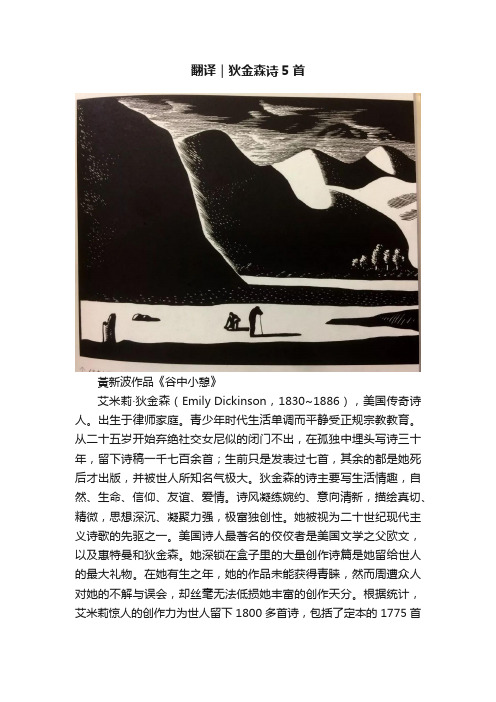
翻译|狄金森诗5首黃新波作品《谷中小憩》艾米莉·狄金森(Emily Dickinson,1830~1886),美国传奇诗人。
出生于律师家庭。
青少年时代生活单调而平静受正规宗教教育。
从二十五岁开始弃绝社交女尼似的闭门不出,在孤独中埋头写诗三十年,留下诗稿一千七百余首;生前只是发表过七首,其余的都是她死后才出版,并被世人所知名气极大。
狄金森的诗主要写生活情趣,自然、生命、信仰、友谊、爱情。
诗风凝练婉约、意向清新,描绘真切、精微,思想深沉、凝聚力强,极富独创性。
她被视为二十世纪现代主义诗歌的先驱之一。
美国诗人最著名的佼佼者是美国文学之父欧文,以及惠特曼和狄金森。
她深锁在盒子里的大量创作诗篇是她留给世人的最大礼物。
在她有生之年,她的作品未能获得青睐,然而周遭众人对她的不解与误会,却丝毫无法低损她丰富的创作天分。
根据统计,艾米莉惊人的创作力为世人留下1800多首诗,包括了定本的1775首与新近发现的25首。
本期选取狄金森的五首诗,和大家分享。
由陈列翻译其中三首,弱之翻译其中两首,是翻译,也是创作。
116 Our share of night to bearOur share of night to bear -Our share of morning -Our blank in bliss to fillOur blank in scorning -Here a star, and there a starSome lose their wayHere a mist, and there a mistAfterwards - Day!116 我黑夜受尽寒霜(陈列译)我黑夜受尽寒霜不得合眼睡着我常是这样在时间的缝隙中安静直等到天发亮阳光在心里出现这时,晨星一同歌唱神的众子也都欢呼253 I've nothing else - to bring, You knowI've nothing else - to bring, You know -So I keep bringing These -Just as the Night keeps fetching StarsTo our familiar eyes -Maybe, we shouldn't mind them -Unless they didn't come -Then - maybe, it would puzzle usTo find our way Home -253 我没别的什么可带,你知道的(弱之译)我没别的什么可带,你知道的所以我总是带着这些–像黑夜总是给我们的亲熟的眼睛带来星星也许,我们不该在乎它们–除非它们不来–那,也许,困扰我们的是:找回家的路。
Emily Dickinson艾米莉·狄金森-美国文学
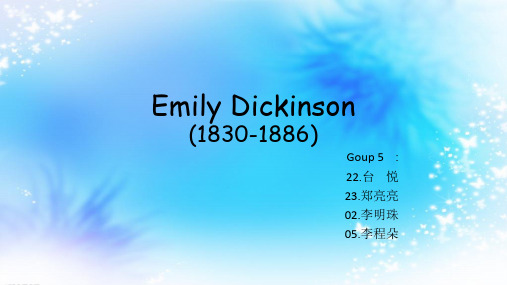
Analysis of this poem
• Theme: love of nature;worried relationship between nature&man; the danger and the beauty of nature; • Writing style: • PUN:one • ALLITERATION: and • END-RHYTHM: ocean&noon;seam&swim;around&head • HALF-RHYTHM:home&crumb • SYMBOLIC: bird(potential danger&) • Four sentences in each saction • Imagery
我听到苍蝇的嗡嗡声——当我死时 房间里,一片沉寂 就像空气突然平静下来— 在风暴的间隙
注视我的眼睛——泪水已经流尽— 我的呼吸正渐渐变紧
等待最后的时刻——上帝在房间里
现身的时刻——降临
I willed my Keepsakes - Signed away What portions of me be Assignable - and then it was There interposed a Fly –
我已经签好遗嘱——分掉了
我所有可以分掉的
东西—-然后我就看见了 一只苍蝇—-
With Blue - uncertain stumbling Buzz Between the light - and me And then the Windows failed - and then I could not see to see -
Attention
Pay attention to the bird’s behavior.
the fish诗歌

the fish诗歌"The Fish" 是一首非常著名的英文诗歌,由美国诗人艾米莉·狄金森(Emily Dickinson)创作。
这首诗描绘了一条鱼在水中游弋的情景,通过鱼的角度来探讨自由、孤独和水的意象。
以下是这首诗的原文。
I'm Nobody! Who are you?Are you –Nobody –too?Then there's a pair of us!Don't tell! they'd advertise –you know.How dreary –to be –Somebody!How public –like a Frog.To tell one's name –the livelong June.To an admiring Bog!I'm Nobody! Who are you?Are you –Nobody –too?Then there's a pair of us!Don't tell! they'd advertise –you know.How dreary –to be –Somebody!How public –like a Frog.To tell one's name –the livelong June.To an admiring Bog!这首诗通过重复的句式和节奏,增强了诗歌的音乐性和节奏感。
同时,通过使用象征和隐喻,诗人传达了对身份、个性和自由的深刻思考。
在这首诗中,"鱼"可以被理解为诗人自己,或者是我们中的任何一个人,它在水中游弋,象征着我们在社会中的存在和互动。
鱼的选择不被人知晓,反映了诗人对于隐私和自我保护的渴望。
艾米莉·狄金森的诗歌赏析
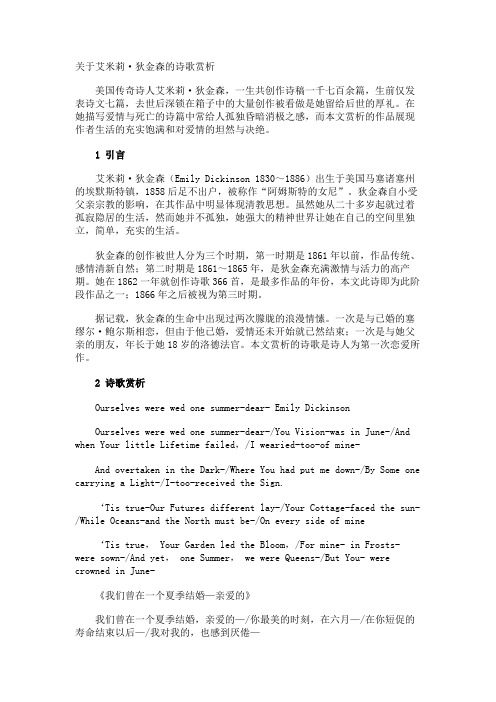
关于艾米莉·狄金森的诗歌赏析美国传奇诗人艾米莉·狄金森,一生共创作诗稿一千七百余篇,生前仅发表诗文七篇,去世后深锁在箱子中的大量创作被看做是她留给后世的厚礼。
在她描写爱情与死亡的诗篇中常给人孤独昏暗消极之感,而本文赏析的作品展现作者生活的充实饱满和对爱情的坦然与决绝。
1 引言艾米莉·狄金森(Emily Dickinson 1830~1886)出生于美国马塞诸塞州的埃默斯特镇,1858后足不出户,被称作“阿姆斯特的女尼”。
狄金森自小受父亲宗教的影响,在其作品中明显体现清教思想。
虽然她从二十多岁起就过着孤寂隐居的生活,然而她并不孤独,她强大的精神世界让她在自己的空间里独立,简单,充实的生活。
狄金森的创作被世人分为三个时期,第一时期是1861年以前,作品传统、感情清新自然;第二时期是1861~1865年,是狄金森充满激情与活力的高产期。
她在1862一年就创作诗歌366首,是最多作品的年份,本文此诗即为此阶段作品之一;1866年之后被视为第三时期。
据记载,狄金森的生命中出现过两次朦胧的浪漫情愫。
一次是与已婚的塞缪尔·鲍尔斯相恋,但由于他已婚,爱情还未开始就已然结束;一次是与她父亲的朋友,年长于她18岁的洛德法官。
本文赏析的诗歌是诗人为第一次恋爱所作。
2 诗歌赏析Ourselves were wed one summer-dear- Emily DickinsonOurselves were wed one summer-dear-/You Vision-was in June-/And when Your little Lifetime failed,/I wearied-too-of mine-And overtaken in the Dark-/Where You had put me down-/By Some one carrying a Light-/I-too-received the Sign.‘Tis true-Our Futures different lay-/Your Cottage-faced the sun-/While Oceans-and the North must be-/On every side of mine‘Tis true, Your Garden led the Bloom,/For mine- in Frosts- were sown-/And yet, one Summer, we were Queens-/But You- were crowned in June-《我们曾在一个夏季结婚—亲爱的》我们曾在一个夏季结婚,亲爱的—/你最美的时刻,在六月—/在你短促的寿命结束以后—/我对我的,也感到厌倦—在黑夜里被你赶上—/你让我躺下—/一旁有人手持烛火—/我,也接受超度亡魂的祝福—是的,我们的未来不同—/你的茅屋面向太阳—/我的四周,必然是—/海洋,和北方—是的,你的园花首先开放—/而我的,播种在严寒—/然而有一个夏季我们曾是女王——/但是你,在六月加冕2.1内容赏析这首诗的题目温婉动人,仿佛带领读者步入一段美好的回忆之中。
艾米莉-狄更斯
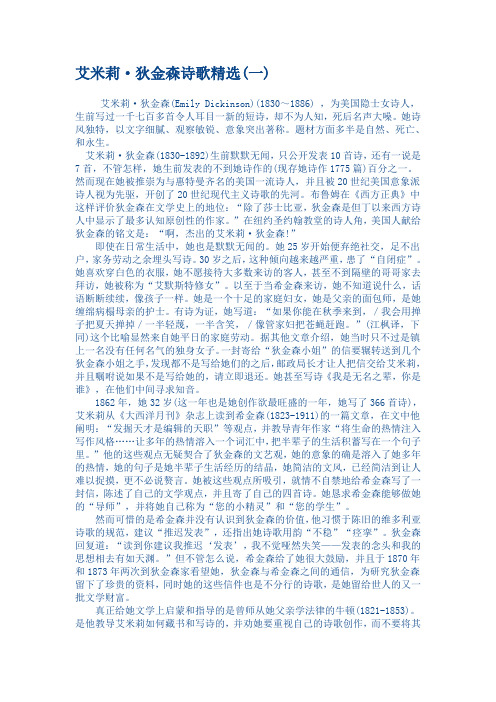
艾米莉·狄金森诗歌精选(一)艾米莉·狄金森(Emily Dickinson)(1830~1886) ,为美国隐士女诗人,生前写过一千七百多首令人耳目一新的短诗,却不为人知,死后名声大噪。
她诗风独特,以文字细腻、观察敏锐、意象突出著称。
题材方面多半是自然、死亡、和永生。
艾米莉·狄金森(1830-1892)生前默默无闻,只公开发表10首诗,还有一说是7首,不管怎样,她生前发表的不到她诗作的(现存她诗作1775篇)百分之一。
然而现在她被推崇为与惠特曼齐名的美国一流诗人,并且被20世纪美国意象派诗人视为先驱,开创了20世纪现代主义诗歌的先河。
布鲁姆在《西方正典》中这样评价狄金森在文学史上的地位:“除了莎士比亚,狄金森是但丁以来西方诗人中显示了最多认知原创性的作家。
”在纽约圣约翰教堂的诗人角,美国人献给狄金森的铭文是:“啊,杰出的艾米莉·狄金森!”即使在日常生活中,她也是默默无闻的。
她25岁开始便弃绝社交,足不出户,家务劳动之余埋头写诗。
30岁之后,这种倾向越来越严重,患了“自闭症”。
她喜欢穿白色的衣服,她不愿接待大多数来访的客人,甚至不到隔壁的哥哥家去拜访,她被称为“艾默斯特修女”。
以至于当希金森来访,她不知道说什么,话语断断续续,像孩子一样。
她是一个十足的家庭妇女,她是父亲的面包师,是她缠绵病榻母亲的护士。
有诗为证,她写道:“如果你能在秋季来到,/我会用掸子把夏天掸掉/一半轻蔑,一半含笑,/像管家妇把苍蝇赶跑。
”(江枫译,下同)这个比喻显然来自她平日的家庭劳动。
据其他文章介绍,她当时只不过是镇上一名没有任何名气的独身女子。
一封寄给“狄金森小姐”的信要辗转送到几个狄金森小姐之手,发现都不是写给她们的之后,邮政局长才让人把信交给艾米莉,并且嘱咐说如果不是写给她的,请立即退还。
她甚至写诗《我是无名之辈,你是谁》,在他们中间寻求知音。
1862年,她32岁(这一年也是她创作欲最旺盛的一年,她写了366首诗),艾米莉从《大西洋月刊》杂志上读到希金森(1823-1911)的一篇文章,在文中他阐明:“发掘天才是编辑的天职”等观点,并教导青年作家“将生命的热情注入写作风格……让多年的热情溶入一个词汇中,把半辈子的生活积蓄写在一个句子里。
英文诗歌
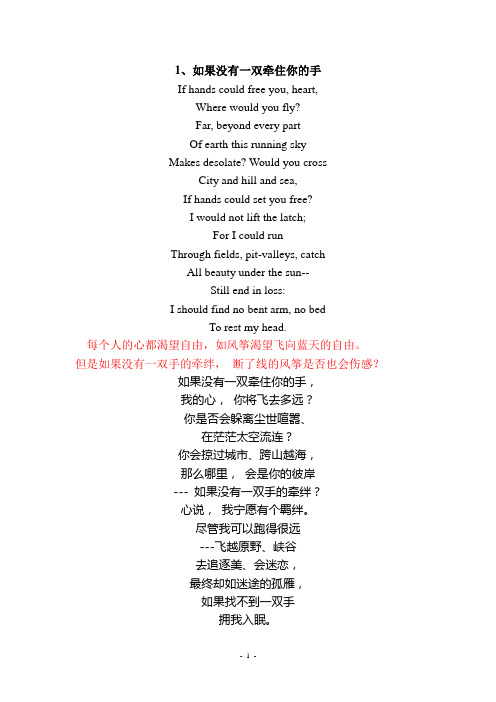
1、如果没有一双牵住你的手If hands could free you, heart,Where would you fly?Far, beyond every partOf earth this running skyMakes desolate? Would you crossCity and hill and sea,If hands could set you free?I would not lift the latch;For I could runThrough fields, pit-valleys, catchAll beauty under the sun--Still end in loss:I should find no bent arm, no bedTo rest my head.每个人的心都渴望自由,如风筝渴望飞向蓝天的自由。
但是如果没有一双手的牵绊,断了线的风筝是否也会伤感?如果没有一双牵住你的手,我的心,你将飞去多远?你是否会躲离尘世喧嚣、在茫茫太空流连?你会掠过城市、跨山越海,那么哪里,会是你的彼岸--- 如果没有一双手的牵绊?心说,我宁愿有个羁绊。
尽管我可以跑得很远---飞越原野、峡谷去追逐美、会迷恋,最终却如迷途的孤雁,如果找不到一双手拥我入眠。
2、Pianowrence(1885—1930)Softly, in the dusk, a woman is singing to me;Taking me back down the vista of years, till I seeA child sitting under the piano, in the boom of the tingling strings And pressing the small, poised feet of a mother who smiles as she sings.In spite of myself, the insidious mastery of songBetrays me back, till the heart of me weeps to belongTo the old Sunday evenings at home, with winter outsideAnd hymns in the cozy parlor, the tinkling piano our guide.So now it is vain for the singer to burst into clamorWith the great black piano appassionato. The glamorOf childish days is upon me, my manhood is castDown in the flood of remembrance, I weep like a child for the past.轻柔宛转,我于暮色中聆听一位女士的浅吟低唱让我的思绪溯回那些年的曼妙风景,直到我眼前一亮一个孩子坐低于钢琴下方,在那窜窜叮铃的回响并且按压出稳健的碎步,属于母亲,笑起来像她吟唱那样。
狄金森诗歌

狄金森诗歌艾米丽·狄金森(Emily Dickinson)是美国著名的女诗人,她的诗歌创作被认为是19世纪美国文学的杰出成就之一。
狄金森的诗歌以其神秘、难以理解的特点而闻名,不同于当时主流的传统诗歌形式,更具有独特的风格和视角,体现了她对生命、死亡、宗教、孤独等话题的深刻思考和感悟。
下面为大家介绍狄金森的一些代表作品。
《我知道一个人——》我知道一个人,他叫‘希望’,他住在灵魂深处,可是,有时他偷偷摸摸地离开了我,我的心就随着他而去了。
他从来没给我带来什么,却一直在我内心的深处扎根,这时我却想不到他的原因,但我知道,他永远住在那里。
这首诗歌表达了狄金森对希望的认识和探索。
在她看来,希望是一种内在的力量,不是简单的渴望或期待,而是一种引导人们向前的动力和信仰。
这种信仰源于内心的自我觉醒,而非来自外界的物质诱惑或干扰。
《我的生命摆在前方——》我的生命摆在前方,在我的脚下展开;没多少脚印留下在路上,我不记得曾经走过去。
我的生命是一只船,渐渐远离了岸边,没有人知道去往何方,船里只有我和自己。
这首诗歌表达了狄金森对生命的思考和感悟。
在她看来,生命就像是一只漂泊的船,注定要离开岸边,独自一人面对未知的前方。
尽管生命的路途很漫长、充满变幻和磨难,但狄金森仍然坚信每一个人都要承担自己的生命责任,担负起前进的使命。
《因为我无法爱你——》因为我无法爱你,我要把你留在昨天,我不敢面对明天,只能把握眼前。
因为我无法爱你,我要用唯一的方式爱你,如果没有我的爱,你的生命也将荒芜。
这首诗歌表达了狄金森的独特情感和爱情观。
她认为,真正的爱情不是表面上的亲密和温暖,而是在内心深处的一种感觉和体验。
如果一个人无法真正地爱另外一个人,就应该承认自己的局限,留下对方一个轻松的心态。
《叫我不要怕死亡——》叫我不要怕死亡,它是早已颠倒的夜晚,万物的仁慈指引我走向黎明,我的步伐轻盈而自由。
叫我不要扭曲我的生命,舞动着我的沉重的心灵,卸下我的偏见,成为一只自由的鸟。
emily dinkinson poem
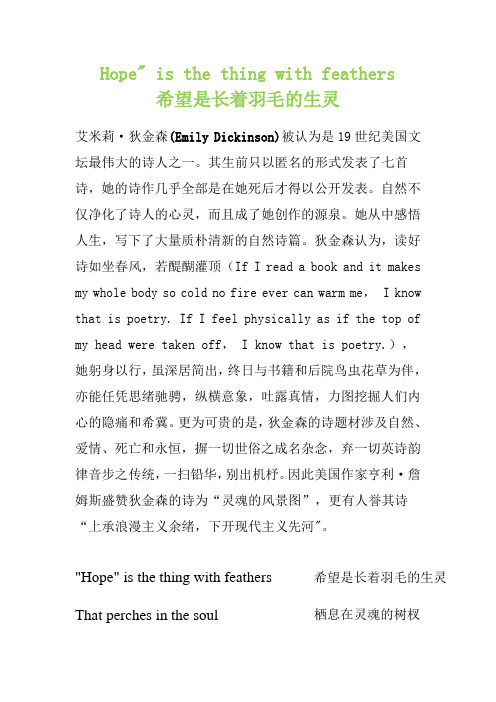
Hope" is the thing with feathers希望是长着羽毛的生灵艾米莉·狄金森(Emily Dickinson)被认为是19世纪美国文坛最伟大的诗人之一。
其生前只以匿名的形式发表了七首诗,她的诗作几乎全部是在她死后才得以公开发表。
自然不仅净化了诗人的心灵,而且成了她创作的源泉。
她从中感悟人生,写下了大量质朴清新的自然诗篇。
狄金森认为,读好诗如坐春风,若醍醐灌顶(If I read a book and it makes my whole body so cold no fire ever can warm me, I know that is poetry. If I feel physically as if the top of my head were taken off, I know that is poetry.),她躬身以行,虽深居简出,终日与书籍和后院鸟虫花草为伴,亦能任凭思绪驰骋,纵横意象,吐露真情,力图挖掘人们内心的隐痛和希冀。
更为可贵的是,狄金森的诗题材涉及自然、爱情、死亡和永恒,摒一切世俗之成名杂念,弃一切英诗韵律音步之传统,一扫铅华,别出机杼。
因此美国作家亨利·詹姆斯盛赞狄金森的诗为“灵魂的风景图”,更有人誉其诗“上承浪漫主义余绪,下开现代主义先河"。
"Hope" is the thing with feathers That perches in the soul 希望是长着羽毛的生灵栖息在灵魂的树杈And sings the tune without the words And never stops -- at allAnd sweetest -- in the Gale -- is heard And sore must be the stormThat could abash the little BirdThat kept so many warmI've heard it in the chilliest landAnd on the strangest SeaYet, never, in Extremity,It asked a crumb -- of Me. 唱着无言的歌儿从来——没有停下它曾庇护了多少温暖狂风中,它的歌声最是甜蜜只有恼羞成怒的暴雨才能让这只小鸟显现窘迫我听见它的声音在最寒冷的土地在最偏远的海洋绝境中,它依然不会张口向我讨要哪怕一屑面包。
艾米莉·狄金森的诗
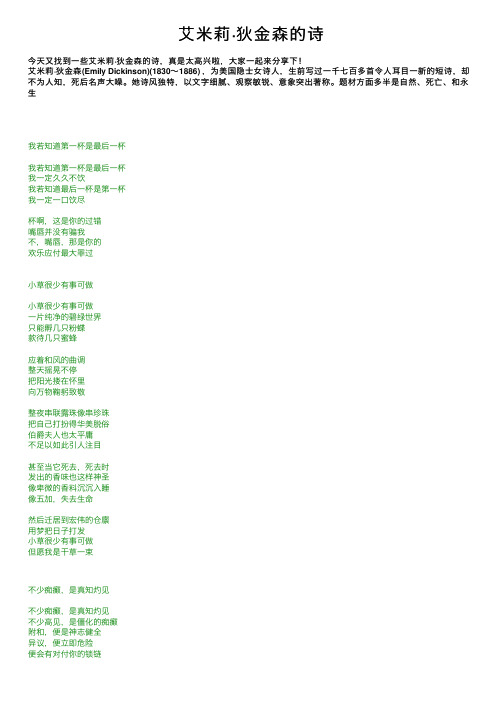
艾⽶莉·狄⾦森的诗今天⼜找到⼀些艾⽶莉·狄⾦森的诗,真是太⾼兴啦,⼤家⼀起来分享下!艾⽶莉·狄⾦森(Emily Dickinson)(1830~1886) ,为美国隐⼠⼥诗⼈,⽣前写过⼀千七百多⾸令⼈⽿⽬⼀新的短诗,却不为⼈知,死后名声⼤噪。
她诗风独特,以⽂字细腻、观察敏锐、意象突出著称。
题材⽅⾯多半是⾃然、死亡、和永⽣我若知道第⼀杯是最后⼀杯我若知道第⼀杯是最后⼀杯我⼀定久久不饮我若知道最后⼀杯是第⼀杯我⼀定⼀⼝饮尽杯啊,这是你的过错嘴唇并没有骗我不,嘴唇,那是你的欢乐应付最⼤罪过⼩草很少有事可做⼩草很少有事可做⼀⽚纯净的碧绿世界只能孵⼏只粉蝶款待⼏只蜜蜂应着和风的曲调整天摇晃不停把阳光搂在怀⾥向万物鞠躬致敬整夜串联露珠像串珍珠把⾃⼰打扮得华美脱俗伯爵夫⼈也太平庸不⾜以如此引⼈注⽬甚⾄当它死去,死去时发出的⾹味也这样神圣像卑微的⾹料沉沉⼊睡像五加,失去⽣命然后迁居到宏伟的仓廪⽤梦把⽇⼦打发⼩草很少有事可做但愿我是⼲草⼀束不少痴癫,是真知灼见不少痴癫,是真知灼见不少⾼见,是僵化的痴癫附和,便是神志健全异议,便⽴即危险便会有对付你的锁链我是⽆名之辈,你是谁我是⽆名之辈,你是谁你,也是⽆名之辈这就有了我们⼀对!可是别声张你知道,他们会⼤肆宣扬做个显要⼈物,好不⽆聊像个青蛙,⾯对仰慕的泥沼在整个六⽉,把个⼈的姓名聒噪,何等招摇我没有时间恨我没有时间恨因为坟墓会妨碍我⽣命并不那么宽裕恨,难以完成我没有时间爱但是既然必须做点什么爱的那点苦⼯我以为对于我,已够繁重我啜饮过⽣活的芳醇我啜饮过⽣活的芳醇付出了多少,告诉你吧不多不少,整整⼀⽣他们说,这是市价他们称了称我的份量锱铢必较,毫厘不爽然后给了我我的⽣命所值⼀滴,幸福的琼浆。
Emily Dickinson (1830-1886) 艾米莉·狄金森

Her love poems
• Love is another subject Dickinson dwelt on.
• One group of her love poems treats the suffering and frustration love can cause. These poems are clearly the reflection of her own unhappy experience, closely related to her deepest and most private feelings. Many of them are striking and original depictions of the longing for shared moments, the pain of separation, and the futility of finding happiness.
• Higginson advised Dickinson not to get her poetry published because of her violation of contemporary literary convention. • Helen Jackson tried to convince her to get her work published but her requests were unsuccessful. • She never approved of publishing her poems and requested her sister Lavinia to destroy all of her pomes • Before her death, only seven poems were published. But after her death, her sister found that she left a large number of poems, altogether, it was about 1800 poems. • After Dickinson’s death, her sister, Lavina, had Emily’s poetry published and then burnt the original copies, because that was her sister’s wish.
美国文学EmilyDickinson迪金森

Weird Recluse?
• She would sometimes send her poems to
people as gifts for valentines or birthdays, along with a pie or cookies.
• She often lowered snacks and treats in baskets to neighborhood children from her window, careful never to let them see her face.
• In 1955, Thomas H. Johnson finally published a collection of her poems that had not been “corrected.” These are the versions we read today.
13
What’s the Difference?
• "If fame belonged to me," she told Higginson, "I could not escape her; if she did not, the longest day would pass me on the chase.… My barefoot rank is better." The twentieth century lifted her without doubt to the first rank among poets.
6
• Between 1858 and 1862, it was later discovered, she wrote like a person possessed, often producing a poem a day. It was also during this period that her life was transformed into the myth of Amherst. Withdrawing more and more, keeping to her room, sometimes even refusing to see visitors who called, she began to dress only in white—a habit that added to her reputation as an eccentric.
- 1、下载文档前请自行甄别文档内容的完整性,平台不提供额外的编辑、内容补充、找答案等附加服务。
- 2、"仅部分预览"的文档,不可在线预览部分如存在完整性等问题,可反馈申请退款(可完整预览的文档不适用该条件!)。
- 3、如文档侵犯您的权益,请联系客服反馈,我们会尽快为您处理(人工客服工作时间:9:00-18:30)。
狄金森诗歌(Emily Dickinson)我从未看过荒原我从未看过荒原--我从未看过海洋--可我知道石楠的容貌和狂涛巨浪。
我从未与上帝交谈也不曾拜访过天堂--可我好像已通过检查一定会到那个地方。
I never saw a moorI never saw a Moor--I never saw the Sea--Yet know I how the Heather looksAnd what a Billow be.I never spoke with GodNor visited in Heaven--Yet certain am I of the spotAs if the Checks were given--云暗天低又复云暗,飞过雪花一片。
穿越车辙马圈,去留择决艰难。
谁人这样待风,令其整天抱怨。
自然犹如我等,时常没戴皇冠。
BecloudedTHE sky is low, the clouds are mean,A travelling flake of snowAcross a barn or through a rutDebates if it will go.A narrow wind complains all day How some one treated him; Nature, like us, is sometimes caught Without her diadem.我是无名之辈! 你是谁?我是无名之辈! 你是谁?你也是无名之辈吗?那么我们为一对!别说! 他们会传开去-- 你知道!多无聊-- 是-- 某某名人!多招摇-- 象个青蛙--告诉你的名字-- 漫长的六月--给一片赞赏的沼泽!I’M Nobody! Who are you?I’M Nobody! Who are you?Are you--Nobody--too?Then there’s a pair of us!Dont tell! they’d advertise--you know! How dreary--to be--Somebody!How public--like a Frog--To tell your name--the livelong June-- To an admiring Bog!" 信念" 是个微妙的发明" 信念" 是个微妙的发明当绅士们能看见的时候--但显微镜却是谨慎的在紧急的时候。
"Faith" is a fine invention"FAITH" is a fine inventionWhen Gentlemen can see--But Microsopes are prudentIn an Emergency.逃亡我一听说"逃亡"这个词血液就加快奔流,一个突然的期望,一个想飞的冲动。
我从未听说敞开的监狱被战士们攻陷,但我幼稚的用力拖我的围栏--只不过再失败!EscapeI NEVER hear the word "escape" Without a quicker blood,A sudden expectation,A flying attitude.I never hear of prisons broadby soldiers battered down,But I tug childish at my bars-- Only to fail again!希望" 希望" 是物长着羽毛寄居在灵魂里,唱着没有词的曲调,绝无丝毫停息,微风吹送最为甘甜暴雨致痛无疑能够使得小鸟不安保有此多暖意。
听它越过奇妙大海飞遍严寒田地可它不要我面包屑哪怕饥饿至极。
"Hope""HOPE" is the thing with feathers That perches in the soul,And sings the tune without the words,And never stops at all,And sweetest in the gale is heard; And sore must be the stormThat could abash the little birdThat kept so many warm.I’ve heard it in the chillest land,And on the strangest Sea;Yet, never, in extremity,It asked a crumb of Me.Emily Dickinson (1861)心先要求愉快(536)心先要求愉快再要求免除疼痛;其后,要那些小止痛片来减轻苦痛;然后,要求睡觉;如它法官的愿望而后应当是要求去死的自由。
The heart asks pleasure firstThe heart asks pleasure first,And then, excuse from pain;And then, those little anodynesThat deaden suffering;And then, to go to sleep;And then, if it should beThe will of its Inquisitor,The liberty to die.补偿为每一个狂喜的瞬间我们必须偿以痛苦至极,刺痛和震颤正比于狂喜。
为每一个可爱的时刻必偿以多年的微薄薪饷,辛酸争夺来的半分八厘和浸满泪水的钱箱。
CompensationFor each ecstatic instantWe must an anguish payIn keen and quivering ratioTo the ecstasy.For each beloved hourSharp pittances of years,Bitter contested farthingsAnd coffers heaped with tears.战场他们雪片般落下,他们流星般落下,象一朵玫瑰花的花瓣纷纷落下,当风的手指忽然间穿划过六月初夏。
在眼睛不能发现的地方,--他们凋零于不透缝隙的草丛;但上帝摊开他无赦的名单依然能传唤每一副面孔。
The BattlefieldThey dropped like flakes, they dropped like stars, Like petals from a rose,When suddenly across the JuneA wind with fingers goes.They perished in the seamless grass, -- No eye could find the place;But God on his repealless listCan summon every face.我没有时间憎恨我没有时间憎恨,因为坟墓会将我阻止,而生命并非如此简单能使我敌意终止。
我也没时间去爱,仅因为必须有点勤奋,我以为爱的那少许辛苦对我已是足够莫大难忍。
I had no time to hate, becauseI had no time to hate, becauseThe grave would hinder me,And life was not so sample ICould finish enmity.Nor had I time to love, but sinceSome industry must be,The little toil of love, I thought,Was large enough for me.我的河儿流向你我的河儿流向你--蓝色的海! 会否欢迎我?我的河儿待回响--大海啊--样子亲切慈祥--我将给你请来小溪从弄污的角落里--说呀--大海--接纳我!(162)My River runs to thee—Blue Sea! Wilt welcome me?My River waits reply—Oh sea—look graciously—I’ll fetch thee BrooksFrom spotted nooks—Say—Sea—Take me!我的朋友我的朋友肯定是只鸟--因为它飞翔!我的朋友肯定是个人,因它会死亡!它有倒刺,象蜜蜂一样!哦,古怪的朋友啊!你使我迷茫!My friend must be a Bird-- Because it flies!Mortal, my friend must be, Because it dies!Barbs has it, like a Bee! Ah, curious friend!Thou puzzlest me!天堂是个医生吗?天堂是个医生吗?他们说他能治病;但死后的医药是没有效用的。
天堂是国库吗?他们谈及我们欠的债;可是那谈判我没参加。
Is Heaven a Physician?Is Heaven a Physician? They say that He can heal - But Medicine PosthumousIs unavailable -Is Heaven an Exchequer? They speak of what we owe - But that negotiationI’m not a Party to -剧痛在于特征上剧痛在于特征上急切在于那迹象告别的狂喜称之为“死亡”当去忍受成长苦恼就因之遭遇我知道许可已经给予去与同类团聚(71)A throe upon the features -A hurry in the breath -An ecstasy of parting Denominated “Death” -An anguish at the mention Which when to patience grown, I’ve known permission given To rejoin its own.痛之神秘痛有一个空白的元素;不能够记起当它开始,或如有一天当它不是痛时。
它没有未来只有自己,包含它无限的领地它是过去,开明的去感知新的痛的周期。
The Mystery of PainPain has an element of blank;It cannot recollectWhen it began, or if there wereA day when it was not.It has no future but itself,Its infinite realms containIts past, enlightened to perceive New periods of pain.对人类而言太晚对人类而言太晚可对于上帝还早创世,虚弱无力的帮助可剩下的,我们还能够祈祷当地上不能存在天堂是何等美妙那时,我们老邻居上帝的表情会多么好客,殷勤,周到It was too late for Man -But early, yet for God -Creation - impotent to help -But Prayer - remained - Our Side -How excellent the Heaven - When Earth - cannot be had - How hospitable - then - the face Of our Old Neighbor God -去天堂!去天堂!我不知何时-请千万别问我怎样!我实在太惊讶想不出回答你!去天堂!多么黯淡悲凉!可是必将做到就象羊群夜晚一定回家给牧羊人来关照!也许你也正在去!谁知道呢?假若你要先到那里就请为我保留一小块空间靠近我失去的两位亲人-那最小的“睡袍”对我会合适和仅仅一点点“花冠”-你知道当我们回家我们不在意穿着我很高兴我不信它因它会停止我的呼吸-而我愿意多看上一眼这样一个稀奇古怪的尘世!我很高兴他们信它他们我再没有找到过自从那伟大的秋天的午后我在地底下离开他们。
